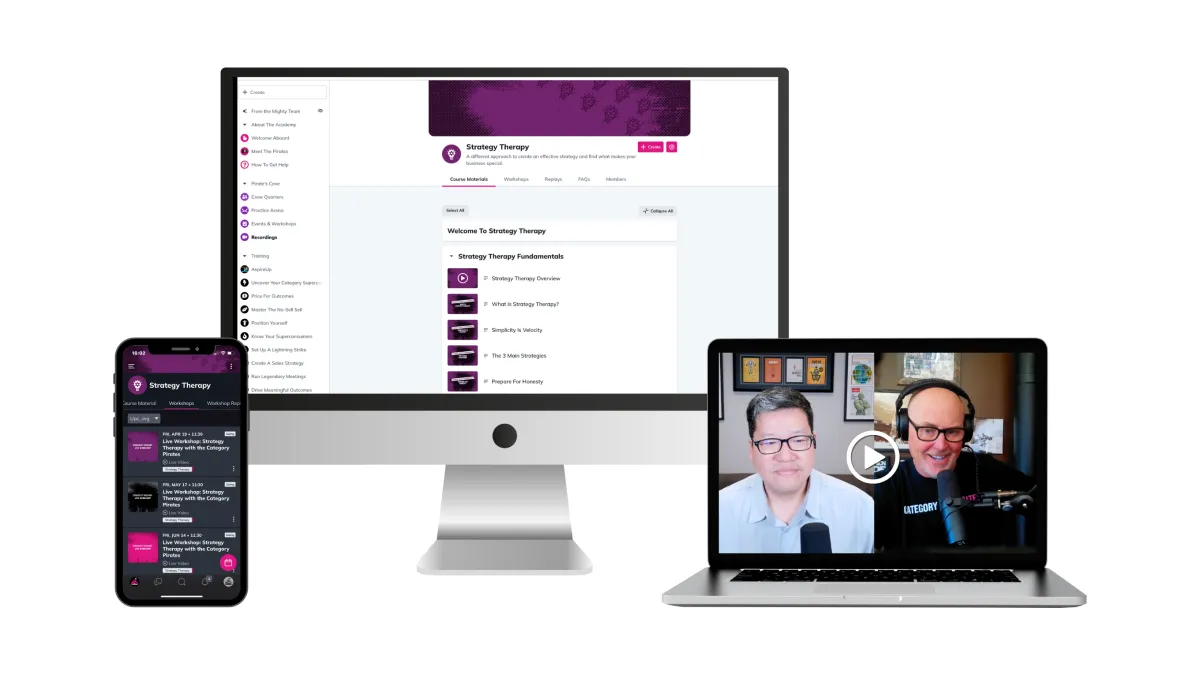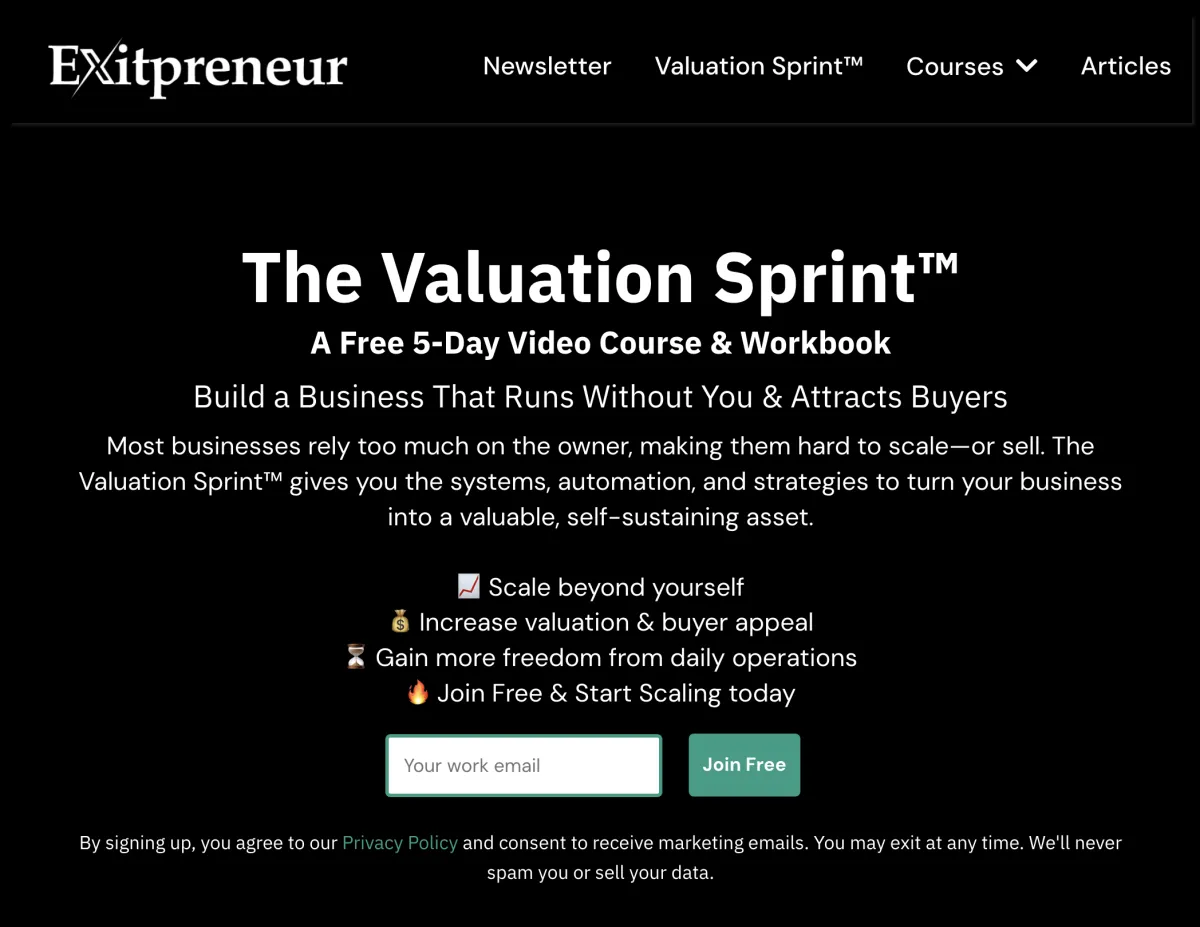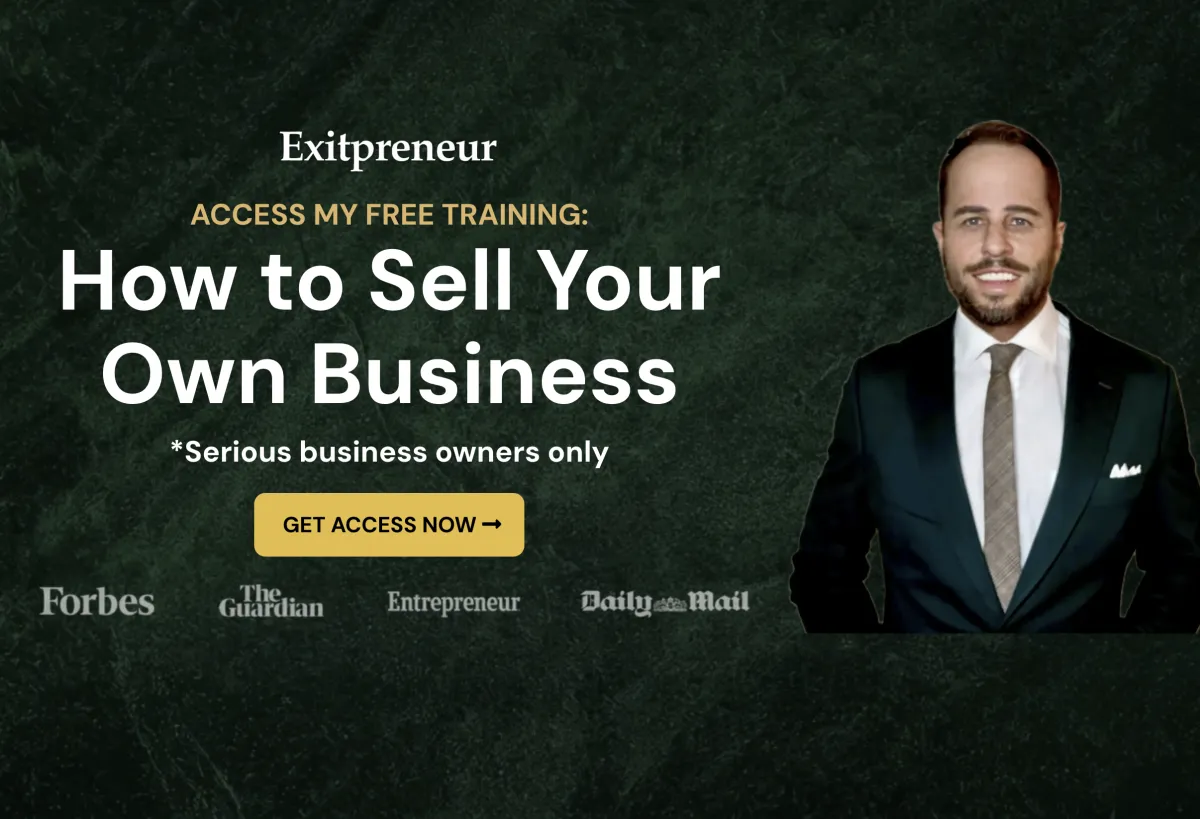FREE TRAINING: How To Sell Your Own Business - 2025 Playbook
Achieving Success through Leadership and Teamwork
How To Sell Your Business
How It Works
Here’s the process in a nutshell. You pay $0 until we sell your business:
Step 1
Valuation (within 12 hours)
We learn about your business, review financials, and let you know what the business is worth and what kind of offers you could expect in the market. Your financials and information are 100% confidential, we even sign a NDA to guarantee that.
Step 2
Broker Agreement
If we accept the business, we’ll extend you our broker agreement, which outlines that we only get paid when you get paid, and the agreed asking price for when we go to market. We welcome your attorney to review this, we have worked hard to make this agreement seller-friendly.
Step 3
Marketing Package (5-14 days)
Our marketing team puts together our state-of-the-art package for buyers. We’ve spent years perfecting what needs to be in the “offering memorandum,“ and making the design the best in the industry to make it stand out.
Step 4
Bank Financing
Simultaneously with the marketing package, part of our process of setting your business up for sale is that we organize SBA 7a financing for the buyer. We have a network of lenders for this, and it allows us to reach a much wider buyer pool.
Step 5
Deal on the Market (1-3 months)
We then take the deal to market. We use three different marketing approaches to find a buyer for your business.
1) We send it to our buyer database. Generally, 70% of our deals get sold to our existing database.
2) We send it out to our marketing channels. We have 13 different marketing channels we use to find people looking for companies to acquire just like yours.
3) We look for synergistic buyers: we create a target list and contact them directly.
Step 6
Accept an Offer
All interested parties submit an offer and you decide on the best buyer depending on price, terms, and their background. The winning buyer then gets an exclusive diligence period to verify what we have claimed about the business.
Step 7
Due Diligence (1-3 months)
The buyer will be given an exclusive period to go through tax returns, bank statements, and operations with you to verify that the business is as claimed.
Step 8
Contract Development
The buyer is responsible for drafting the purchase agreement. They will send a draft, and your attorney will review this to make sure you are protected. We have attorneys for you if you need one.
Step 9
Sign & Escrow (2-7 days)
The fun part. We sign everything, and our third party escrow holds the buyers’ cash until your business assets are transferred. Then escrow wires you your funds, and the deal is closed!
Step 10
Training & Transition (1-3 months)
After the deal closes, there is a transition period where you help the new owner learn about the business, introduce them to employees/vendors, etc. This is normally negotiated and agreed upon before the deal closes as to how long and how hands-on this process is.
Ready for your valuation?
Get Started
About Business Exits
Business Exits is a business brokerage started by entrepreneurs, for entrepreneurs. Serving nationwide, we specialize in selling your business for the best price. If you have questions or want a valuation on your business, you can contact [email protected].
Our brokers are in:
Los Angeles, CA
Orange County, CA
New York, NY
Miami, FL
Phoenix, AZ
Las Vegas, NV
Atlanta, GA
Novi, MI
FAQ
Frequently Asked Questions
Are there any upfront fees for you to sell my business?
No. We are only paid if the business sells. Hence, we are picky about the types of businesses and business owners that we work with, as we have a proven process. We have a 90%+ closing ratio.
How long will it take for you to sell my business?
While it’s impossible to know exactly how long it will take, it typically takes about 3 months to find the right buyer and 2 – 3 months of due diligence, legal, banking, etc. to close the deal. This can be shorter or longer depending on your selling price expectations, how “in-demand” the business is, location (near a major metropolitan area or on the outskirts), how quickly you can get us access to information, how much cash flow the business produces, and how complicated the deal is. We’ve found buyers within a day or it could take up to a year, depending on many factors. However, we always find a buyer. This is a market, though, so how much a buyer is willing to pay for your business is subjective. All that we can guarantee is that we position your business for the best price and terms through our proven, proprietary process. Our process usually produces multiple buyers. We sell 90%+ of the businesses that our sellers entrust us to sell.
Have you sold a business exactly like mine?
While no business is exactly the same, we have sold businesses in every industry. In cases where we have not sold your exact type of business, we’ve probably sold something similar. Since we always find buyers, the important part of this process is not whether we have some “special” buyer for your business, but whether we can get you a great price, great terms, and get the deal to close. “Having a buyer” is less important than you probably think. This isn’t real estate. While you, of course, need a buyer to close a transaction, we always find a buyer. How you run your process is much more important. This is where we shine. This is a complicated process, with lots of moving parts. We’re experts at this. We’ve done this many, many times. We’ve sold very niche and very complicated businesses and have often dealt with the unexpected. Our business brokers / M&A advisors are not typical at this level of the market. They have great backgrounds. Remember, there is a big difference between finding a buyer (or having your own) and actually getting a deal closed. There is structuring, due diligence, banking, legal, taxes, and third-party valuations. Any of these parts can quickly derail your deal. Even if your buyer isn’t an expert, their service providers probably will be. We find that we pay for ourselves, or more, in some aspect of this process. We get your deal done and get you paid. Less than 20% of privately held businesses sell. We sell 90%+. Enough said…
Contact Us For a No-Obligation Chat
LET’S TALK
How much is my business worth?
While there are some rules of thumb (and lots of bad information on the internet), most “Main Street” businesses and lower-middle market businesses sell for a multiple of the cash flow of the business. This is not your net income. There are adjustments that are made to the net to better reflect what the new owner, company, or private equity firm would make, if they bought your business. These adjustments need to be within reason. Please don’t tell us that if Big Company “A” buys your small or medium-sized business, they will have zero operating expenses. For Main Street companies, typically, those worth less than $5 million, businesses sell for a 1 -4 multiple of SDE (Seller’s Discretionary Earnings). For lower-middle market and middle market businesses, this can be a 2 – 8 multiple of “adjusted” EBITDA (Earnings Before Interest, Taxes, Depreciation, and Amortization). Obviously, these are wide ranges. Hence the need for a business valuation. Don’t just pick the top multiple in the previous sentence. Just for some perspective, typical EBITDA multiples on Wall St are 11, absent bear or bull market extremes.
However, to narrow business valuation down to a simple multiple would be an insult to business valuations. This is why we spent 2 years in business school and 3 years completing the CFA (Chartered Financial Analyst) program. Business valuations are a complex and fickle beast. This is why stocks are so volatile. The future is hard to predict. We will walk you through our “three-legged stool”. This is how valuations at the Main Street and lower-middle markets are based. This usually gives sellers confidence that a) we know what we’re doing and b) lifts some of the fog about how businesses are valued. We are happy to present this information to you, so you can see it for yourself.
There are many factors at play. One of the worst mistakes we see business brokers and some M&A advisors make is making way too many adjustments, commonly known as add-backs. Most likely, the buyer, the bank, or the third-party valuation company won’t accept most of those adjustments. This throws the seller’s expectations completely off, killing the deal. We know what adjustments are acceptable and which are not. Unfortunately, many business brokers will use these adjustments, that they know won’t work, to try to get you to sign up with them. Meanwhile, they know the price they tell you it’s “worth” will never happen. Please know that we are not miracle workers. If you’ve spent a lot of effort hiding cash or putting too many personal expenses into your business tax returns, you’re only hurting yourself when it comes time to sell your business.
Finally, we know your “friend” or “cousin” sold their business for 3X – 10X revenues, but this only happens in the rarest of cases. These are companies typically involved in technology, Silicon Valley, or venture capital-backed companies. These are “disruptive” companies that change industries and eventually have billions in revenue, and possibly, billions in earnings, like a Tesla or Uber. Is that your company?
How much do you charge to sell a business?
This is completely dependent on the size of the business. We charge the standard commission that most business brokers or M&A advisors (for larger deals) would charge. Since our fee is a “success fee”, the more you get for your business, the more we’re paid, as well. This keeps us aligned. Call or email us for more details.
Who is going to buy my business? I can’t imagine it won’t be a competitor of mine?
This is what most business owners think. The truth is, we don’t know if your buyer is going to be another company, a private equity firm, or a high-net worth individual. In our experience, strategic buyers (these are what companies in your industry are called) below the $5 million value level are cheap. Meaning, unless they have previous M&A experience and understand the value of acquiring a business, and the resulting synergies, they won’t be highest bidder or give you the best terms. When we find a company who understands M&A, great. This is the best buyer for your business. We can slide them right into your seat. Otherwise, companies tend to be cheap. They would rather spend hundreds of thousands on marketing or hiring salespeople, than spend the millions it might take to buy your business. This changes, a bit, above the $5 million level. High-net worth individuals tend to fall off and the buyers become predominately private equity firms and strategic buyers (companies). For these lower middle-market and middle market sellers, we run personalized campaigns to find the RIGHT company or PE buyer to buy your company. This is not easy.
At Exitpreneur, since we don’t know exactly who is going to buy your business, we create marketing materials that attract lots of different types of buyers. Different types of buyers want different things. Sellers have to be prepared to answer certain questions in certain ways, depending on who the buyer is. Otherwise, it might kill your deal. We coach you to answer these questions. While we certainly do not want you to be deceptive in your answers (this will kill your deal), as mentioned, different buyers have different motivations to buy your business. It’s important to highlight these differences. Your answers will probably be different than you think.
Finally, if your company is worth less than $5 million, please don’t think Big Public Company “A” is going to buy your business and pay you any amount to do so. You’re likely going to be disappointed. Big Public Company “A” is primarily concerned with bigger deals that will move the needle. It’s hard to get a public company to pay attention to your small business with a few million in revenue. Plus, they’re probably not going to pay you what you think. Remember, Big Public Company “A” often has an internal deal team. These are former investment bankers who know how to value a business. However, if you’ve got revenue of $20 million+ and you’re growing at 50%+ per year, that might be a different story.
I don’t want everyone to know that I’m selling my business, especially my employees or competitors? How do we keep this quiet?
Great question. We know this is extremely important. Our process is very confidential. We’ve been very successful keeping these deals under wraps. Everyone signs an NDA (non-disclosure agreement) before we give out any information on the business. Except for public companies and private equity firms with known, committed capital, we also ask for a buyer profile. This tells us who they are, where they work/live, and the types of funds they have.
As far as your employees, we agree that this should not become known, especially to the rank and file. We have meetings with buyers at the business, outside of business hours or on weekends. Many times, the employees will not know the business is being sold until the deal closes and you announce the deal. Since there is always a transition period, this will give you and the new owner time to let the employees know that their jobs are safe. You can also get them excited because better opportunities may lie ahead, as the new owner will want to grow his way out of the debt, leading to bigger and better responsibilities for current employees. This might mean more money for them, as well. In some cases, where there are “key” employees, the buyer may insist that they speak with these types of employees before the deal closes. This usually happens near the closing, after all other due diligence is completed, financing is secured, and legal is basically complete. For most small businesses, this is rare. “Key” employees are usually making six figures, have an outsized impact on revenue, and are not easily replaceable. This is not a manager at a Subway, unless they’re running twenty of them for you.
I’m not ready to sell my business. Will you give me a business valuation?
Yes, of course. We love doing this. This is a common part of an exit strategy. Let’s face it. Most sellers come to us with their hair on fire, needing to sell their business immediately, for one reason or another. Since these businesses are rarely properly positioned to be attractive to buyers, we love when folks come to us 3 to 5 years out (or more) to find out how their business is valued. This gives them plenty of time to change what needs to be changed. Buyers don’t like to see huge changes right before a business is sold. Time is an important element. In addition to the obvious quantitative factors, this gives sellers plenty of time to work on the qualitative factors that buyers want to see in an attractive business. We will value your business for a modest fee and go over those qualitative factors that will best position your business for success when it’s time to sell. This will likely add hundreds of thousands of dollars to your business’s value, at worst, if not millions. We have many happy customers who’ve been pleased with this service. Who knows? If we like your business enough, we might invest and get you where you want to be in a more direct fashion.
What size businesses do you usually work with?
$1 million to $50 million in revenue. We’ve also worked with much larger businesses than $50 million in revenue in the past, at different stops in our careers, but this seems to be the most common revenue amounts that we come across at Exitpreneur.
Will you help me buy a business?
To be quite honest, this depends. For individual buyers, we only do “searches” in very rare instances. Instead, it’s better if you think a bit about what kind of business that you want, before you contact us. While you may be open to many different kinds of businesses, it’s a wide, wide world out there and we don’t know what’s best for you. Start by looking at
BizBuySell
. We would recommend you stay away from anything on the front page: laundromats, dry cleaners, car washes, convenience stores, etc. Begin with your previous business experience as a guide. To make the kind of money you’re probably going to want to make, you’re probably going to need or want financing. This allows you to buy a bigger business that produces more cash flow. A bank will want you to have some industry experience or at least previous experience running a business before they give you a loan. This is an SBA mandate for deals below $5 million in loan value. The SBA will back almost any bank you’re going to talk to because they guarantee the loans to the tune of 75% for the bank. Your experience can be somewhat fungible, depending on the type of funds you have. Meaning, the more personal capital you have to collateralize the loan, the less direct experience you will likely need in that type of business. However, the less capital, the more direct experience you’re going to need. By the way, while some seller financing is usually available to some degree, when you buy a business, this does not mean the seller is going to finance 80%-90% of the deal and you can skip the bank. Seller financing is usually 0% to 30% of the purchase price. The more “in-demand” the business is, the less the seller will have to finance. Simple as that. Leave the “no money down” to the late-night infomercials for real estate. This is not that. I’d be worried about adverse selection in a situation where an owner, who could get 70%+ up front, allows you to only put down 10%-20% to buy his or her business. That business is probably in trouble.
Here’s what we do for individual buyers: While you will have to pay for a full, complete, third-party business valuation as part of the SBA financing process, this will not happen until the deal is about to close. So how much should you offer on a business that you found? That’s where we can help. We’ll value the business up front, so you know what a good or bad offer will look like. We are aware that you’ll be paying for this twice, so our fees are reasonable.
In the rarest of cases, we will back an industry executive who knows exactly what type of business they want to buy and we will become his or her miniature private equity arm. You will operate or oversee the businesses while we will hunt for deals and find the capital for those deals. Contact us for more details.
Finally, if you are a business, we will do a search for one of your competitors or a business within your supply chain, to buy. We have successfully done this in the past and these are the only types of “searches” we do, unless we’re involved in a private equity fashion via above. Please contact us for more details.
Why should I pick Exitpreneur versus the other business brokers / M&A advisors?
Great question. Unfortunately, the business brokers and M&A advisors helping small to medium-sized businesses in this country are not very good. They’ve never been trained properly. While their resumes may sound impressive to the uninitiated, there’s a massive difference for those that truly know how sell-side M&A is done. Most business brokers in this country are former business owners, who, once they sell their business, decide that they want to become business brokers. While we have the utmost respect for the entrepreneurs in this country, this is not a good background for M&A. We say this because we get complaints from buyers about business brokers who “don’t know what they’re doing”, all the time. While they may understand some aspects of accounting and finance from running a business, you need someone who knows this process inside and out. Others will have more impressive resumes from public companies who bought other companies, or buy-side M&A. Legal or CPA’s are the other usual suspects. None of these folks have the total training that is involved in sell-side M&A.
Here’s an example. In some aspects, the accounting and finance at this level is more difficult that public companies. It’s the Wild West. We are not dealing with audited financials. We often have to take a deep dive into the financials to understand what the problems are. Finance is just one aspect. What makes this difficult is knowing the combination of accounting, finance, legal, due diligence, and banking. If you don’t know a decent amount about all of these, your deal is likely to fail. Here’s why: Sometimes, it’s the smallest detail that can make a deal go south. You never know where this aspect will rear its ugly head. Legal is a great example. Each opposing attorney is trying to get the best deal for their client. Let’s face it, by creating arguments, this creates billable hours for the attorneys. Since the buyer and seller don’t know anything about law, they take their attorney’s word to the grave. Often, this results in a stalemate and it’s thrown back into our lap, where both sides need to make a “business decision”, as to what they will accept. While we are not attorneys, having some functional knowledge of the situation could be the difference between the deal dying or closing. This same situation can play out in accounting, banking, or with the third-party business valuation. This is why you need good representation and why we get so many of our deals closed at Exitpreneur. Otherwise, the numbers speak for themselves. Less than 20% of privately-held businesses sell. We close 90%+. Don’t settle for second-best. This will probably be one of the most important financial decisions of your life. Can you trust this to anyone else?
Let’s Talk
What They’re Saying
My experience in working with Greg Knox of Exitpreneur Business Sales was 5 star. Greg was clear, straight forward and prompt in all of my dealings with him. I received excellent and strategic advise for the sale of my business. This is a ringing endorsement for Exitpreneur Business Sales.
Jan Goldman
Having never sold a business before I had no idea what to expect. We chose Exitpreneur because of their presentation, preparation and their energy to sell our business/property. Wes was outstanding in walking us through each step, offering us guidance, perspective and a sounding board when needed. There were what seemed to be insurmountable obstacles at times during this process. Without Wes’s dedication, perseverance, ingenuity and his ability to work with people the sale would not have happened. I would strongly recommend Wes and Exitpreneur Business Sales. Top notch customer service.
Suzanne Piispanen
After doing an extensive evaluation and comparing their prior work and sale strategy to that of several other business brokers in the area, we selected Exitpreneur Business Sales to represent us in the sale of our business. Their credentials, knowledge, experience and enthusiasm about our business set them apart. They helped us understand the sale dynamics of the M&A mid-market and created realistic valuation expectations. We concluded their ability to understand and promote our very successful, high growth but unusual business, would result in the best outcome. We were right in our assessment. Derik located multiple interested strategic buyers that produced more than one serious offer. The negotiations with the acquiring company were tough with some significant bumps that Greg and Derik’s experience helped us overcome. We got a great result for our employees and for the owners. We would recommend them without reservation.
Bob Taylor
Greg is extremely knowledgeable in the Mergers and Acquisitions space. His expertise was extremely valuable in getting a true valuation on a business opportunity. The seller and I came to a fair agreement just today and I couldn’t be happier with Greg’s continued support and dedication through the negotiation. There were multiple opportunities for me to make a mistake and his guidance was beyond reproach. The outcome was exactly as it should be thanks to Exitpreneur Business Sales. I hope to complete this deal and when the next opportunity arises I won’t be looking anywhere else. Thanks again Greg.
Darin LaFon
Confidential. Contact. Conversation.
Let’s get started.
The experts at Exitpreneur Business Sales are ready to talk to you about mergers & acquisitions and business brokers’ role in the process. And it’s always 100% confidential.While we certainly love when you call, as you can imagine, we spend the majority of our day on the phone, closing deals, so we love it even more when you use this form to email us! We will get back to you as quickly as possible! Seriously! This form only goes to Greg’s email (Exitpreneur owner), so it’s completely confidential!Our unique selling process is tailored for businesses with at least $2 million in revenue (up to $100 million) and $500,000 to $10,000,000 in owner’s profit.
How to Value Your Business for Sale: A Comprehensive Guide
December 18, 2024
When preparing to sell your business, determining its value is one of the most critical—and often complex—steps. An accurate valuation helps you, as a seller, show potential buyers the actual value of your business.
Working with skilled business brokers like Exitpreneur Business Sales makes the process smoother. They help your business attract qualified buyers and […]
Read More
The Hidden Costs of Selling Your Business: What You Need to Know
December 5, 2024
Selling your business can open the door to exciting new opportunities—whether that means embarking on a fresh venture or finally taking that long-deserved retirement. But it’s rarely as simple as signing a contract and handing over the keys. For small to mid-sized business owners, selling is a complex process, one that’s often full of hidden […]
Read More
Navigating Offers and Negotiations: Tips for Securing the Best Deal
November 14, 2024
Receiving an offer for your business is a significant milestone, but it’s just the beginning of the negotiation process. Securing the best deal requires thoroughly understanding buyer motivations, market conditions, and effective negotiation strategies. At Exitpreneur Business Sales, we guide business owners through the intricacies of deal-making to maximize the sale outcome. This post will […]
Read More
How to Value Your Business for Sale: A Comprehensive Guide
December 18, 2024
When preparing to sell your business, determining its value is one of the most critical—and often complex—steps. An accurate valuation helps you, as a seller, show potential buyers the actual value of your business.
Working with skilled business brokers like Exitpreneur Business Sales makes the process smoother. They help your business attract qualified buyers and […]
Read More
The Hidden Costs of Selling Your Business: What You Need to Know
December 5, 2024
Selling your business can open the door to exciting new opportunities—whether that means embarking on a fresh venture or finally taking that long-deserved retirement. But it’s rarely as simple as signing a contract and handing over the keys. For small to mid-sized business owners, selling is a complex process, one that’s often full of hidden […]
Read More
Navigating Offers and Negotiations: Tips for Securing the Best Deal
November 14, 2024
Receiving an offer for your business is a significant milestone, but it’s just the beginning of the negotiation process. Securing the best deal requires thoroughly understanding buyer motivations, market conditions, and effective negotiation strategies. At Exitpreneur Business Sales, we guide business owners through the intricacies of deal-making to maximize the sale outcome. This post will […]
Read More
How to Value Your Business for Sale: A Comprehensive Guide
December 18, 2024
When preparing to sell your business, determining its value is one of the most critical—and often complex—steps. An accurate valuation helps you, as a seller, show potential buyers the actual value of your business.
Working with skilled business brokers like Exitpreneur Business Sales makes the process smoother. They help your business attract qualified buyers and […]
Read More
The Hidden Costs of Selling Your Business: What You Need to Know
December 5, 2024
Selling your business can open the door to exciting new opportunities—whether that means embarking on a fresh venture or finally taking that long-deserved retirement. But it’s rarely as simple as signing a contract and handing over the keys. For small to mid-sized business owners, selling is a complex process, one that’s often full of hidden […]
Read More
Navigating Offers and Negotiations: Tips for Securing the Best Deal
November 14, 2024
Receiving an offer for your business is a significant milestone, but it’s just the beginning of the negotiation process. Securing the best deal requires thoroughly understanding buyer motivations, market conditions, and effective negotiation strategies. At Exitpreneur Business Sales, we guide business owners through the intricacies of deal-making to maximize the sale outcome. This post will […]
Read More
We are the world's leading specialist in Business Sales and will continue to lead the way with innovative and creative systems to enable every entrepreneurial minded person to create and build the future, through business.
Schedule an appointment to meet with a Exitpreneur Business Sales Professional. Gather documents requested by your Exitpreneur Business Broker for your meeting. During your meeting you will be asked a series of comprehensive questions to help us develop a clearer picture of your business and what approach we will take to obtain buyer interest in YOUR business. Determine Market Valuation/Price for your business utilizing Exitpreneur's proven valuation methods including discretionary income and expenses.Listing Agreement authorizing Exitpreneur to represent you in the sale of your business.Seller pre-approval of Listing Marketing/Advertising and potential terms offered. Exitpreneur Business Broker to manage Buyer inquiries and Buyer pre-qualification process including buyer signing of NDA (Confidentiality Agreement) Exitpreneur Business Broker to arrange meeting between Buyer and Seller. Exitpreneur Business Broker to assist in writing and/or presenting offers and subsequent contract negotiations. Exitpreneur Business Broker to manage the timeline from offer acceptance to closing (transfer of ownership to the Buyer)
Sellers Frequently Asked Questions
Why should I use a Business Broker to sell my business?
Business Owners who have sold a business in the past will likely tell you it is long, stressful process. Selling your own business can actually hurt the value of your business as it takes your focus away from the day to day operating of your business at a critical time when you should be increasing or at least maintaining your current business. When a Exitpreneur Business Broker assists you in the process it can pay off in more ways than just the price obtained. Exitpreneur Business Brokers will help properly value your business, reach out to buyers they already have, reach a larger number of new buyers, allow you to continue running your business rather than taking your focus away, maintain confidentiality and most importantly assist with the closing of your transaction based upon experience and training. The most common mistake potential Sellers make is comparing the selling of their business to selling a house. Unlike realtors, we keep your listing entirely confidential, and work with you each step of the way until we sell your business.
Why Exitpreneur Business Brokers?
With unsurpassed experience since 1994, offices across the U.S. and some of the most highly trained Business Brokers in the industry Exitpreneur is the "Clear Choice" when it comes to choosing a Business Brokerage to represent you. Our Business Brokers are experts in the field of business valuation, business sales, business marketing and buy/sell negotiations to satisfy both buyers and sellers alike.
How is my business for sale kept confidential?
Unlike the sale of a home or even commercial building businesses do not have a "for sale" sign. Business Sales must be kept confidential; all buyers are required to sign a NDA (Buyer Confidentiality Agreement) prior to detailed information about your business being provided. This helps to prevent employees, suppliers, customers and competitors from finding out that you are selling your business.
How will my business be advertised?
With Exitpreneur Business Brokers your business will be on the highest rated Websites specifically for your area as well as national and international sites. Other advertising mediums may be employed based on your type of business.
How do I know how much my business is worth?
Exitpreneur's proven methods of valuing and marketing will put your business in the best possible position to sell. Exitpreneur Business Sales Professionals are some of the most highly trained professionals in the industry.
How long will it take to sell my business?
The average properly priced business tends to sell in approximately 90 days however this time frame can vary greatly based on the income of your business (and how easy it is to prove), type of business, the terms offered and the area in which your business is located. Your local Exitpreneur Business Sales Professional will provide you with more information on your local market.
Will Buyers be visiting my business?
After a Buyer has signed an NDA (Buyer Confidentiality), reviewed initial information and expressed a further interest in your business your Exitpreneur Business Sales Professional will schedule a meeting for the Buyer to view your business at a time that is appropriate for your type of business.
How do Buyers write offers to buy my business?
Most Buyers looking at your business will be represented by a Professional Business Broker who will assist them in writing an offer that expresses their price, terms, contingencies (if any) and request for further documentation (if any). The offer will then be presented to you for your approval by your Exitpreneur Business Broker and/or the Buyer's Agent.
Who will handle all the inquiry calls on the sale of my business?
Your Exitpreneur Business Sales Professional is trained to deal with incoming inquires (often tire kickers) and help determine which of those Buyers might be ready to move to the next level.
Who will handle the negotiations on the sale of my business?
Your Exitpreneur Business Sales Professional is trained to deal with negotiations on the sale of your business. Your Exitpreneur Business Broker will help navigate you through the entire process; we'll be with you every step of the way.
How long will I have to train the person who buys my business?
This is a negotiable point but we have found that most Buyers will ask for 30 days. Some types of businesses only require a week or two of training while other more complicated businesses may require a longer familiarization period. If a longer period is required we often find that Sellers will negotiate a consulting fee for extended training periods.
After I sell my business can I open another one at some point in the future?
All Buyers will ask that you sign a covenant not to compete within a certain area and/or time period.
Will I need to finance part of the purchase price of the business?
There is no requirement that you "carry paper" on your business however in today's market it is very common that Buyers will ask for some type of Seller Carry Note which in reality opens your business to a larger pool of Buyers.
When should I notify my employees that I am selling the business?
While you may have a close relationship with your employees it has been proven time and time again that the best time to tell your employees is when you introduce them to the new owners. This may be difficult for you emotionally however experience dictates that silence is the best practice. The exception to this rule would be if a "key" employee is part of the negotiation for the Buyer to keep them on after the sale is complete. In this case there may be some advance notice required to this person and this person alone. Your Exitpreneur Business Broker will guide you through the proper timing for this very important part of the business. Timing is everything!
Will my Exitpreneur Business Broker qualify the Buyer by checking their credit?
Exitpreneur does not check the credit of Buyers however through the offer and acceptance process you may request that the Buyer provide you with a copy of their credit report. This is not often asked of the Buyer as the property owner and/or landlord will likely be obtaining a credit report for their review.
Your Exit Strategy doesn’t have to be complicated. Simplify it, and start increasing your valuation while preparing for your big payday.
The honesty and clarity you need to become known for a niche you own.
All entrepreneurs struggle with “lost in translation” problems.
You can't get everyone on the same page, because you don’t have a compelling strategy on 1 page.
If you're reading this, chances are one (or more) of these problems are keeping you up at night:
1. You have the right strategy but the wrong words.
You have the right strategy, category problem, and unique POV. But you can’t explain it exactly how you want to your team, investors, and board. Or even worse, your customers.
2. You have the right strategy but too many words.
Your strategy takes too long to explain, and no one can remember (or repeat) it to others. You can’t pierce through the noise. So your team, investors, and customers aren’t on the same page.
3. You have the wrong strategy but the right words.
Your words are clear and compelling. So good that no one tells you the brutally honest truth—the problem you’re solving (and thus, your strategy) is wrong.
These problems lead to wasted time and lost revenue. But you can solve them with a clear, powerful strategy.
Strategy Therapy is an emotional, introspective process that helps align your business with category design principles.
It consists of three pillars:
1. Brutal honesty
You get to be brutally honest about your strengths and weaknesses to uncover what sets you apart.
2. Radical courage
You build the courage to embrace your strengths and differentiate yourself.
3. Simplicity through clarity
Once you know where you are and where you want to go, you can simplify your strategy to fit on one page.
1. Brutal honesty
You get to be brutally honest about your strengths and weaknesses to uncover what sets you apart.
2. Radical courage
You build the courage to embrace your strengths and differentiate yourself.
3. Simplicity through clarity
Once you know where you are and where you want to go, you can simplify your strategy to fit on one page.
Once you embrace Strategy Therapy, everything changes.
You’ll be able to answer 3 questions:
1. What “one thing” honestly makes your business different, not better?
2. How special, courageously different, and valuable is your “one thing” to customers?
3. How does your “one thing” impact your company and category?
And you’ll have a coherent one-page plan that helps align your team before you launch, before you raise capital, or before you blow all your capital.
Meet Your Strategy Captains — The Category Pirates

Eddie Yoon has written more for the HBR on category strategy than any other person.
Eddie is the founder of EddieWouldGrow, LLC, a think tank and advisory firm on growth strategy, and a co-creator of Category Pirates.
Previously, Eddie was one of the senior partners at The Cambridge Group, a strategy consulting firm. His work over the past two decades has driven over $8 billion dollars of annual incremental revenue. In particular, eight of his clients have doubled or tripled in revenue in less than eight years. Eddie is one of the world’s leading experts on finding and monetizing Superconsumers to grow and create new categories.
He’s the author of the book, Superconsumers: A Simple, Speedy and Sustainable Path to Superior Growth (Harvard Business School Press, 2016), which was named one of the Best Business Books of 2017 by Strategy & Business.
Eddie has been helping companies build winning strategies for three decades. He knows the power of Strategy Therapy frameworks (because he designed many of them)—and he’s ready to help you apply them to your business.

Christopher Lochhead is co-author of Play Bigger and Niche Down and a “godfather of category design.”
Lochhead is a #1 Apple Business Podcaster, #1 Amazon Marketing author, a category designer, and co-creator of Category Pirates.
He hosts the award-winning dialogue podcast “Follow Your Different” and the award-winning “Lochhead on Marketing” podcast. The Marketing Journal says he’s “one of the best minds in marketing”, Podcast Magazine says he’s “the best business podcaster,” NBA legend Bill Walton calls him “a quasar,” and The Economist calls him “off-putting to some.”
Lochhead has been an advisor to over 50 venture-backed startups, is a venture capital limited partner, a former three-time Silicon Valley public company CMO (Vantive, Scient, Mercury Interactive), and an entrepreneur.
With over 35 years in the entrepreneurial foxhole, he’s experienced the bliss of winning, the pain of losing, made a lot of friends and a few enemies, and learned to laugh about the whole thing. He’s raised venture capital, taken companies public, helped create billions in market cap, been part of countless M&A transactions, served on many boards, been on the cover of few magazines and has failed a lot, been publicly criticized, humiliated, and fired. A bunch.
He’s been featured in/on Harvard Business Review, CNBC, CNN, Fox Business, Associated Press, The Economist, CBS News, Fortune, Forbes, Business Insider, and countless podcasts.
He thinks George Carlin was right, whisky is a good thing, The Ramones are legendary, Tom Waits is a gift, K.D. Lang and Leonard Cohen are angels, and social media “influencers” and “hustle porn stars” are a scourge on the earth.
He also believes that if you don’t have a one-page strategy, you don’t have a strategy.

Katrina Kirsch is the Head of Publishing & Operations for Category Pirates.
Katrina Kirsch has worked behind the scenes as a writer and ghosteditor for Silicon Valley founders and multi-billion dollar tech startups, helping entrepreneurs position, edit, and publish their work. She has collaborated on several books and 530+ articles for HubSpot, Photographers Without Borders, Digital Press, M1 Finance, and more.
Discovering category design changed the course of her career.
Today, she runs Category Pirates, Strategy Therapy, and the Category Design Academy—the training ground for category design consultants and advisors ready to grow their businesses, 3x their pricing, and design a legendary career.

Lisa Kostova
Founder & CEO of CareerClimb® Co
"Most of my clients are genuinely smart. But they have been conditioned by our educational system to be straight A students. So they're really good at getting a handful of instructions and saying, "This is my roadmap. I can execute on this roadmap." Now, I can give them a strategy roadmap as to how to start thinking differently."
You’ll get feedback on your strategy in monthly live workshops with the Category Pirates.
Ask questions, get answers, and pitch your strategy alongside other students. You’ll connect with fellow category designers and refine your one-page strategy.

Who is Strategy Therapy for?
Not everyone is the right fit for this course.
You're not a good fit for this course if:
You believe entrepreneurs can’t do strategy themselves and need a Big 3 consulting firm to hold your hand and tell you how to be “better.”
You want your strategy handed to you.
You’re not willing to do the hard, deep-thinking work required to create a different category.
You play it safe by managing existing things, driving incremental improvements, and keeping the trains running.
You believe success is about beating the competition, being better, and playing a comparison game.
You're a good fit for this course if:
You’re willing to reassess or even pivot from your existing business strategy.
You’re willing to receive brutally honest feedback about whether or not your company or category is special.
You want to stand out and make your place in the business world.
You want to remove complexity and focus on the one thing that makes your company special to your customers.
You know that success is about creating net new value, new offerings, and new categories.

Nick Bennett
Founder of Harness & Hone
"The source of volume analysis hit me in the face like a sack of bricks. I didn't think I had very much data to support my whole program. And I realized I have a ton of data about people when they enter the category, when they start making money, how they start making money. I have a lot of stuff, and it didn't really click for me until I did the Strategy Therapy course."
Ready to hone your strategy?
Here's everything you get instant access to once you join Strategy Therapy.
33+ lessons to help you create a simple, powerful strategy
Develop a strategic plan in one week with step-by-step guidance. No need to sift through endless free content – it’s all here in one place.
8 AI prompts to help you be brutally honest about your business
Get immediate insights into your strategy's weaknesses and strengths. Hear feedback you won’t get from your team, friends, or investors.
1-Page Strategy Narrative Template
Quickly create a clear strategy one-pager that aligns your team. No need to start from scratch.
Monthly 60-minute live workshops to get feedback
Continuously improve your strategy with live workshops, where you’ll get coaching from the Category Pirates and listen in on the feedback we give to others. This is the only way to access the knowledge we’ve gained from decades of strategy experience that’s produced billions in revenue for businesses, beyond a 5-figure coaching call or a 7-figure advisor investment (only available in Strategy Therapy).
13+ strategy case studies from past students
Avoid common mistakes by seeing feedback from past students. Get insights you can implement in your own one-page strategy.
Lifetime updates & access
You’ll always have access to the most current Strategy Therapy training and tools. No need to pay for future updates.
BONUS: Free eBook copies of The Annual Strategy Planning Trap and Competition Derangement Syndrome by Category Pirates
Avoid common strategy planning pitfalls, break free from a competition mindset, and learn the fundamentals of Category Design ($35.99 value)
BONUS: 1 free month of the Category Pirates newsletter (79+ mini-books)
Reject the premise of traditional business and start thinking “different” with a top 10 paid business Substack newsletter focused on category design insights and ideas. Dive into category design principles and stories of real-life Category Kings, without extra cost ($20 value)
The Strategy Therapy course is $1,000 US.
You might be thinking, “Wow pirates! That’s a great deal for training created from decades of strategy experience that’s produced billions in revenue for businesses.”
But if you just had a heart attack because a G-note sounds like $999 too much, we understand. Check out our books, top 10 paid business newsletter, free podcasts, or the 100% free Strategy Sprint email course.
Not ready to dive in yet?
Most of the business content that exists is Obvious. So if you want Non-Obvious content about how to think differently in the business world, where do you go? What do you read?
The answer is Category Pirates.
By signing up, you agree to our Privacy Policy and consent to receive marketing emails. You may walk the plank at any time. We'll never spam you or sell your data.

"IRON" Mike Steadman
Entrepreneur & three-time national boxing champion
"I finished all the Strategy Therapy content over the weekend—absolutely world-class. The Category Pirates App is like a mobile MBA in my pocket at all times."
Frequently Asked Questions
How can a one-page strategy capture the complexity and nuances of my business?
A one-page strategy is designed to distill the most critical elements of your business into a clear, actionable plan. It focuses on what truly matters, ensuring simplicity without sacrificing depth. Even complex companies like Amazon and Tesla have simple strategies. For example, the Master Plan Tesla shared in 2006 was:
1. Build sports car.
2. Use that money to build an affordable car.
3. Use that money to build an even more affordable car.
4. While doing above, also provide zero emission electric power generation options.
In business, simplicity is velocity.
What if my business has unique challenges that a simplified approach might overlook?
Simplifying your strategy doesn't mean dumbing it down. Your strategy one-pager will address your unique challenges, which is why the course includes frameworks and AI prompts to consider your specific needs and intricacies.
Elon Musk summed up Tesla’s 10-year master plan in 6 sentences. Jeff Bezos built Amazon as the largest and most convenient online store with a simple strategy: Obsess over customers. To be straightforward—your business can hardly be more complex than that.
If your problem is connected to not having a unique business strategy you can feel 100% clear about and confident in, then this course will help you. If that's not your problem, it won't.
How do I ensure that brutal honesty won't demoralize my team or create internal friction?
Let’s be brutally honest with each other. Most companies sugar-coat their strategy with complexity. We don't take that approach. We're not here to make you feel good about yourself. We're here to help you create a great strategy.
Many teams feel a sense of "finally, we've cut the BS” relief after taking Strategy Therapy.
Will my leadership team and stakeholders be open to such a critical and transparent evaluation?
If you’re not open to hearing an honest evaluation of your company, this isn't the course for you. We'll help give you the tools and courage to have those tough conversations, but we won't try to convince the unwilling.
What if the bold moves suggested don’t pay off and end up being too risky?
Category design and differentiated strategy are inherently risky. We'll help you manage that risk by zeroing in on what makes you uniquely valuable. But the execution is up to you. No guts, no glory.
How will the market respond to a drastically different approach?
We don't have a crystal ball. Category creators shape new market realities, so it's impossible to predict with certainty. But our research shows that category designers capture 76% of the value they create. Strategy Therapy helps you craft a strategy that sets you up to win big.
How much time and effort will this course require daily?
We designed Strategy Therapy for busy entrepreneurs running startups, and we've made efficiency a top priority. The course is self-paced, so you can knock it out over an intensive weekend or spread it out over a week or two.
Most folks spend about 1-2 hours per day on it over a few days.
The course combines video and written lessons and is organized into four training modules. You’ll work through these at your own pace, but you’ll share your one-page strategy at the end of the first module. We give you direct written feedback you can think about and implement while going through the rest of the course.
Once a month, we hold a 60-minute live workshop for students to ask questions and get feedback on their updated strategy one-pagers. These group workshops are small (10-20 people), and everyone is respectful of time. This is a great opportunity to learn from others and ask questions.
We know this training model isn't for everyone—and we’re not here to convince you it's right for you.
How practical and feasible are the frameworks suggested in the course?
If you're close-minded, the Strategy Therapy approach will help you less than a screen door on a submarine.
The whole point of this course is to challenge conventional thinking. If you're open to change, the frameworks are immensely practical, and the 1-page format makes them highly actionable.
It’s kinda like normal therapy. It’s valuable because it’s tough and leads you to incredible transformation.
What guarantees are there that this course will deliver the promised results?
Business strategy takes time to unfold, and there are no overnight miracles. But by the end of this program, you WILL have a clear, compelling 1-page strategy and a concrete action plan. And you'll be part of a community supporting you as you implement your strategy.
How is Strategy Therapy different from other strategy courses or consultants I’ve tried before?
Strategy Therapy revolves around category design principles of radical simplicity, brutal honesty, and differentiation. No one else (that we know of) takes this approach or truly understands it. We've been working on it (successfully) for over three decades. So it'll be tough to find this information anywhere else.
Add to this that most strategy courses (and courses in general) manufacture complexity to sound smart. We get straight to the point.
Three things set us apart:
1) Radical simplicity - we cut the fluff and focus on what matters
2) Category design - we help you create your own market category, not just compete better, and
3) Brutal honesty - we challenge you to confront inconvenient truths and take bold action.No other program combines these critical elements.
My current strategy, while not perfect, has been working reasonably well. Is it worth shaking things up drastically?
If you're okay with the status quo, keep at it—and good luck. This course is for people who want to shake up the status quo and create a different category. You have to want to move from competing to creating. We recognize this isn't the right fit for everyone.
This course doesn't give you “best practices” to take you from ok to good (you can always hire a super ding-dong consulting firm for that).
It gives you radical courage, brutal honesty, and pristine clarity to take you from good to different.
Can’t I learn this myself with all of the free content out there?
It’s possible. But you might not find much information about the Strategy Therapy framework. That's because, from what we've seen, no one has ever taught how to approach strategy in this way.
We created the course because we heard from so many leaders frustrated with the annual strategy planning process.
They've read all the strategy books and still felt locked into a competition-first approach.
Now, sure, you could go and aggregate our content, chase down senior-level executives to figure out the pitfalls and challenges on your own…
But if we're brutally honest, most people won’t go through the effort of looking for these resources, organizing them, and creating an honest strategy.
If you can, great. You don’t need this course. But you will miss out on the main value of Strategy Therapy - the honest feedback from the pirates and the live workshop to connect with other category design strategists.
Okay, I’m sold. What happens after I buy the course?
Once you checkout, you’ll get an email with instructions explaining how to access the course. This will include a unique link specific to you. You’ll click this link to create an account, and then have immediate access to all of your course materials.
Ready to design a different strategy and own your category?



